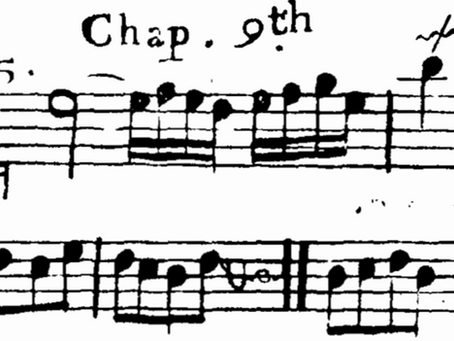top of page
Reimagining Historical Voices
Search


Georg Falck on the use of Extemporised Florid Ornaments and Trills in an Ensemble Setting (1688)
‘Although they are set only in the system of the cantus, these examples of accentus and variation of intervals can be used in the other...

Tim Braithwaite


Johann Samuel Petri’s Advice for Teaching a Congregation to Harmonise a Chorale Extempore (1767)
Question. How can one remedy the fault that a choir, when it sings a well-known church chorale without sheet music, as must often happen,...

Tim Braithwaite


Do Tosi and his commentators prefer too many or too few ornaments?
I was recently flicking through an instruction book aimed at teaching modern singers how to ornament eighteenth-century repertoire, and I...

Tim Braithwaite


Johann Friedrich Agricola (1757) and Wolfgang Caspar Printz (1678) on Choral Singing
‘The loudness or softness, especially on long and serious notes, must be observed even by those who sing the supporting voices [not the...

Tim Braithwaite


Michael Praetorius on the Requirements of a Singer and Expected Vocal Ranges
‘Firstly, a singer must have a voice by nature, in which three requirements and three flaws are to be noted. The requirements are these:...

Tim Braithwaite


Johann Matthias Gesner’s Description of J.S. Bach Directing from the Keyboard (1732)
‘To Marcus Pabius Quintilianus You would think but slightly, my dear Fabius, of all these [the accomplishments of the citharists], if,...

Tim Braithwaite


Johann Quantz on ‘Allzuhäufigen Trillerns’
§6 ‘Some persons believe that they will appear learned if they crowd an Adagio with many graces, and twist them around in such fashion...

Tim Braithwaite


Johann Quantz on Articulation for Singers and Exceptions to Inégalité (1752)
’Also excepted is all quick passage-work which must be executed by the human voice, unless it is supposed to be slurred. Since every note...

Tim Braithwaite


Comparing Tosi, Galliard, and Agricola on the Articulation of Passaggi
Tosi describes two main types of articulation for the performance of fast notes, the ‘marked’ (‘battuto’) and ‘glided’ (‘scivolo.’)

Tim Braithwaite


Johann Quantz on German Church Singing (1752)
‘What the German manner of singing was like in times past may still be perceived today from the singers in choirs...

Tim Braithwaite


Wolfgang Mylius on Florid Ensemble Singing (1686)
'In such other florid ornaments which well-practiced singers use when singing solo, one has a lot of license and freedom, so that the...

Tim Braithwaite


Johann Petri on High Falsetto Singing
‘A certain soprano who was very skilled and excellent at singing in falsetto (but was not a castrato) once sang arias rising to an e’’’ ...

Tim Braithwaite
bottom of page
